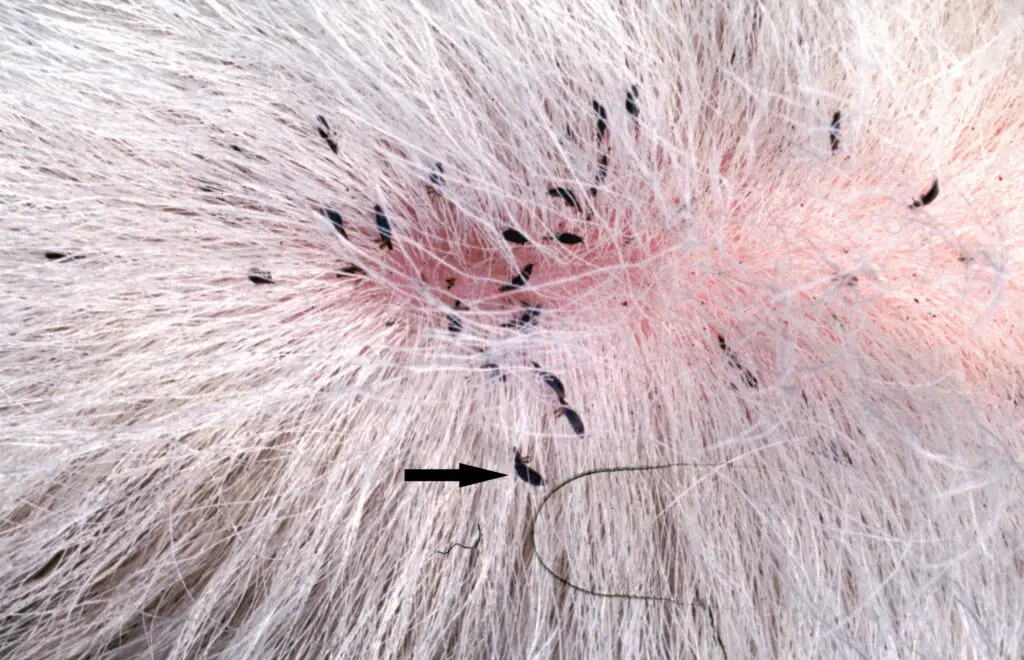
Cattle Lice on Humans! If you work with cattle or spend time on a farm, you might have come across the term “cattle lice”. These tiny critters can be a real nuisance for your herd, but what about you? Can cattle lice bite humans and turn into a personal problem? It’s a valid concern, but thankfully, there’s some good news. Let’s dive into the world of cattle lice, understand the risks (or lack thereof) to humans, and learn what to do if you’re worried.
What Do Cattle Lice Look Like?
Before we talk about their love for humans (or lack of it), let’s identify these critters! Cattle lice are small insects, usually reddish-brown in color, and they don’t have wings. There are two main types:
- Biting Lice: These guys munch on skin debris and secretions.
- Sucking Lice: These live up to their name and feed on blood.
Can Humans Get Cattle Lice?
Here’s the reassuring part: cattle lice are incredibly picky about where they live. They’re adapted specifically to survive on cattle and won’t thrive on a human host. Phew!
Can Cattle Lice Transfer to Humans? (Is Cattle Lice Contagious to Humans?)
Imagine cattle lice as tiny, confused tourists. They’re adapted to the warm, hairy environment of a cow, and if you get close enough to an infested animal, a louse might accidentally hitch a ride on your clothes. But just like a tourist in the wrong country, they won’t be able to stay long. Cattle lice can’t reproduce on humans, and they’ll likely hop off pretty quickly in search of a more suitable bovine host. Good hygiene practices, like washing your hands and clothes after working with cattle, will further discourage these lost lice adventurers.
How to Get Rid of Cattle Lice
Dealing with cattle lice is mostly a matter of looking after your herd’s well-being. Here’s what’s involved:
- Insecticides: There are various topical and injectable insecticides designed specifically to take down cattle lice.
- Veterinarian Guidance: It’s always best to consult your veterinarian for the most effective and safe treatment plan for your cattle.
- Prevention: Good management practices, like keeping a clean environment and quarantining new animals, can help prevent lice infestations in the first place.
Cattle Lice to Humans: Potential Effects
So, what’s the worst that could happen if cattle lice give your skin a brief exploration? In most cases, not much. You might experience some mild irritation, but it’s unlikely to be anything serious. However, if you notice any unusual or persistent symptoms, it’s always a good idea to check in with your doctor.
What is the Treatment of Lice in Humans?
Human lice are a whole different ballgame from cattle lice. Thankfully, there are effective treatments available:
- Over-the-counter (OTC) medications: Lice shampoos and creams are often the first line of defense.
- Prescription medications: If OTC treatments don’t do the trick, your doctor might prescribe a stronger option.
Important: Always follow the instructions on any lice treatment carefully. Misuse can make the problem worse!
What Kills Lice Immediately?
Let’s be honest, when you’ve got lice, you want them gone ASAP! While there are a few home remedies floating around (like vinegar or essential oils), their effectiveness can be limited. For a proper knockout punch against human lice, it’s usually best to turn to medical-grade treatments.
Is Lice Harmful to Humans?
The main issue with lice is the itching. That constant scratching can lead to irritated skin and sometimes even secondary infections. Besides head lice, there are a few other types of human lice to be aware of:
- Body lice: These tend to live in clothing and bedding and only move onto skin to feed.

FAQ Section
Can cattle lice live in my house?
Highly unlikely! Cattle lice need a bovine host to survive. They won’t find your house a welcoming environment.
Can cattle lice live in my hair?
Again, this is very unlikely. Cattle lice are adapted to the type of hair found on cattle, not the hair on your head.
Should I be worried if I find cattle lice on myself?
Take a deep breath! While it might be slightly gross, remember cattle lice won’t thrive on you. A good shower and washing your clothes is usually all you need
Conclusion
While the idea of “cattle lice on humans” might sound alarming, the reality is that these critters pose minimal risk to us. They’re much more of a problem for your herd than for you! However, being aware of cattle lice and practicing good hygiene when working with animals is always a smart move. And remember, if your cattle are itchy, dealing with their lice problem is not just for their comfort, it helps stop them from accidentally becoming hitchhikers onto you.
If you think you might be dealing with a human lice infestation, don’t hesitate to seek medical advice. Prompt treatment is the best way to get rid of these pesky critters and get back to feeling itch-free.
Do you have any experience with cattle lice? Did any of this information surprise you? Share your thoughts in the comments below!
